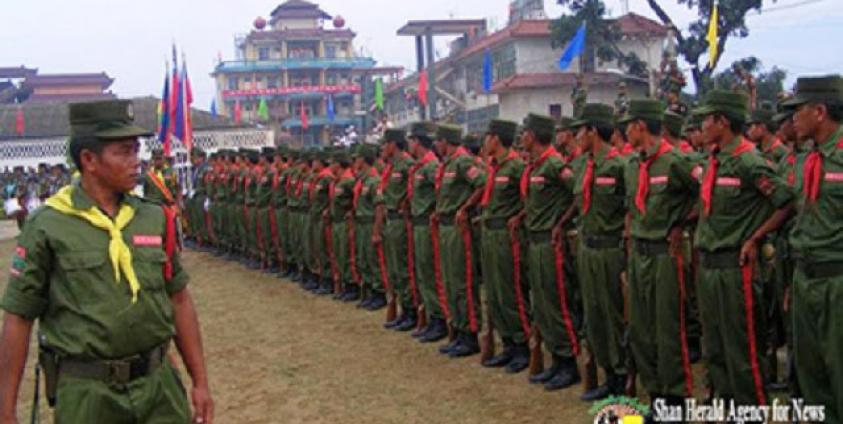Sai Wansai — The second round of peace talks initiated by State Administration Council (SAC) Chairman and Commander-in-Chief Senior General Min Aung Hlaing, which began on September 26 and ended on September 30 ended, without any concrete outcome for the United Wa State Army (UWSA), National Democratic Alliance Army (NDAA) or Mongla and Shan State Progress Party (SSPP) negotiation partners.
The UWSA asked to be granted a statehood, or ethnic state within the existing union short of total independence; NDAA wanted self-administered division in place of its present Special Region 4 status; and the SSPP tabled federal amendment proposal in order to achieve ethnic equality, which includes the forming of a “Bamar State” together with proper decentralization and power-sharing in politics and resources, including fiscal federalism, within the mold of federal democratic union.
Min Aung Hlaing was non-committal to any of the proposal and just said all were agreeable in principle but will have to walk through the parliamentary process, which included adhering to the Military-drafted 2008 Constitution and voting where three-fourth of the parliamentary votes are needed to alter or create new ethnic state and self-administered zone or division.
SAC Spokesman General Zaw Min Tun echoed his boss Min Aung Hlaing’s position when he told the media: “We have already accepted the establishment of a union based on democracy and federalism. In this respect their (non-Bamar ethnic groups) wishes and opinions of obtaining ethnic state and self-administered zone or division will have to go through the parliamentary system. That’s why whenever we meet I always mention this necessity to go through parliamentary procedure. The Tatmadaw (Myanmar military) will support this agreement if these issues come up in the parliamentary sessions.”

NDAA Mongla security forceNDAA Mongla security force.
However, the said agreement in principle by the junta to the Wa statehood aspirations and Mongla Self-Administered Division is questionable according to the Shan Nationalities League for Democracy General Secretary Sai Leik. He said that the rights of sovereignty belong to the people inhabiting the said areas and not any government or for that reason not the coup-maker junta. Another argument is that since the military only wields 25 percent of parliamentary seats, its agreement and promise will come to naught if the other 75 per cent parliamentary stakes don’t vote for the formation of a new ethnic state or new self-administered division.
Besides, the 2008 Constitution Chapter 12, Amendment of the Constitution, Section 436 (a) writes: “If it is necessary to amend the provisions ….., it shall be amended with the prior approval of more than seventy-five percent of all the representatives of Pyidaungsu Hluttaw, after which in a nation-wide referendum only with the votes of more than half of those who are eligible to vote.”

UWSA NDAA and SSPP delegates meet with SAC in Naypyitaw.
Thus, first the junta proxy party Union Solidarity and Development Party (USDP) has to come to power and also the military bloc must be garnered with seventy-five percent of the votes to make its “in principle agreement” to the Wa and Mongla come true, not to mention the more than fifty percent of the electorate affirmative votes. In other words, an almost impossible feat to realize.
Concerning the SSPP federal amendment proposal, the outlook of taking into account for discussion is not even entertained, much less achieving real ethnic equality within the junta’s version of union based on democracy and federalism, which it means is altering a bit here and there of its Military-drafted Constitution with some democratic and federal trappings, while the military supremacy doctrine will be preserved intact.
It is indisputable and evident when on September 2, just two days after the second round peace talks SSPP Spokesman Colonel Sai Su told the Than Lwin Times: “Our presentation to form a Bamar State within the federal system is not accepted (by the SAC Chairman). We cannot replace (the constitution) with what we want, nor can we move the chapters around. For them (the SAC), we can only discuss it according to the relevant chapter according to the table and according to the section. We can amend the 2008 constitution section by section and can give opinions.”
And if the EAOs going to Naypyitaw might have thought that the SAC leader has consolidated the three powers of legislation, executive and judiciary in his hands post-coup and could decide on a give-and-take outcome leading to their benefit, as the junta’s Spokesman Zaw Min Tun has time and again been trying to portray the scenario, they may be barking at the wrong tree.
Having said that, the EAOs will be well off by not bargaining or talking to the coup-maker military junta, as it isn’t the one with legitimacy and also trustworthy partner but an international outcast and tyrant. Instead it will make more sense to empower the ethnic-democratic loose alliance to become more solid, formidable and fight in unison, with or without outside help, to uproot the military dictatorship.







